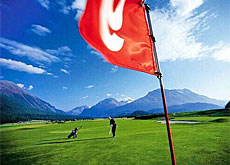How to adapt the Disneyland approach

Swiss tourism expert Peter Keller tells swissinfo what Switzerland can learn from Disneyland and how it can better exploit low-cost airline flights.
Keller is the head of the tourism department of the State Secretariat for Economic Affairs (Seco) and is a professor at Lausanne University.
He is also president of the International Association of Scientific Experts in Tourism (AIEST). It is holding its 56th annual meeting in the southeastern resort of Pontresina in the Upper Engadine Valley.
It’s the first time in 20 years the AIEST conference is taking place in Switzerland.
swissinfo: Why is there a need for such an association?
Peter Keller: Everybody is a tourist, but tourism is a complex business. There is a lot of competition. Tourism has been a research discipline for about 60 years now. It’s normal that people active in this field meet from time to time, and that’s why AIEST was founded in Switzerland.
swissinfo: The Swiss tourist industry is often compared with other alpine nations such as Austria. But what can it learn from tropical, seaside destinations?
P.K.: That’s the advantage of the scientific approach. We have models which you can apply to many fields, such as value-based pricing. That means customers pay more the bigger the attraction. It can be an amusement park or a region like the Upper Engadine Valley. The approach, the way it functions, and why people have to pay more for such attractions is the same.
swissinfo: In that case, what can tourism officials here in the Upper Engadine learn from Disneyland?
P.K.: On the contrary, Disneyland imitated what was done here in the 19th century. They built palace hotels within this idyllic landscape. Early postcards show that the environment here was portrayed as if it was an amusement park. The idea was to create a dream world. Walt Disney imitated that and standardised it.
Americans are very innovative in tourism because they know how to take ideas from Europe and standardise and industrialise them.
swissinfo: But surely the Swiss can now learn a thing or two from such a popular chain of amusement parks?
P.K.: They can learn how to brand, position and standardise products and manage destinations professionally. The Engadine is not an amusement park but the principles for managing either are the same.
swissinfo: Is Switzerland well positioned to adapt to external factors such as natural disasters, terrorist attacks, or on the positive side, the arrival on the scene of low-cost carriers?
P.K.: Yes, I think so. The low cost carriers are becoming very efficient easing access to tourist resorts. This is changing the tourist structure. In France for example, Ryanair and easyJet are responsible for the [boom] in holiday homes.
A lot of French regions depend on the economy created by second homes sold to British customers and this is because low-cost carriers have eased access. So this means transport is changing the structure of tourism. It can also create niche markets in Switzerland, increasing the number of conferences held here and attendance at university master courses.
swissinfo: Should Switzerland position itself more strongly as a safe destination?
P.K.: People already know Switzerland is a safe country, so you don’t need to promote this fact.
swissinfo-interview: Dale Bechtel
The 2006 AIEST Congress takes place in Pontresina from August 27-31.
This year’s theme was “Dealing with Volatile Demand in Tourism”.
The experts discussed a number of issues including branding, recovery strategies following “tourism shocks”, and assessing marketing effectiveness of new media.
The Association of Scientific Experts in Tourism (AIEST) was founded in the post-war period by the heads of the Swiss tourism research institutes at St Gallen and Bern universities.
The inaugural meeting took place in Rome in 1951.
Its aim is to be an “international catalyst of scientific activities in tourism”.
The 2006 Congress in Pontresina is the first time the meeting has been held in Switzerland for 20 years.

In compliance with the JTI standards
More: SWI swissinfo.ch certified by the Journalism Trust Initiative

You can find an overview of ongoing debates with our journalists here . Please join us!
If you want to start a conversation about a topic raised in this article or want to report factual errors, email us at english@swissinfo.ch.